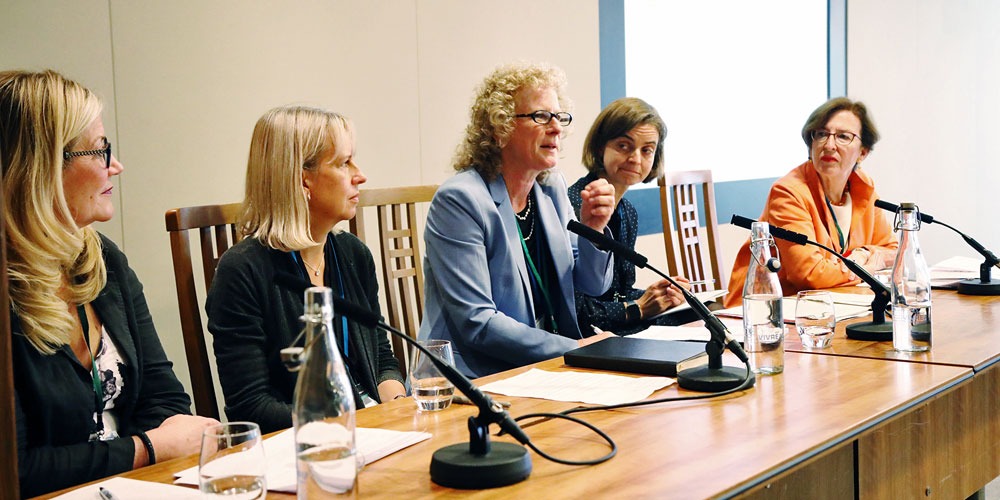A panel of finance directors gathered at Room151’s FDs’ Summit last week to chew over the implications of the recently-announced one-year spending settlement.

In August, the government unveiled a one-year spending settlement for the public sector. The announcement received a mixed reaction within local government. There was surprise – even delight – in some quarters at the size of the amount awarded to the sector. But this was tempered by a feeling that a one-year settlement does nothing to help councils plan for the medium term, and that huge uncertainties over local government finance remain.
2nd Housing & Regeneration Finance Summit
October 31, 2019, County Hall, London
During a panel session held at this year’s FDs’ Summit, organised by Room151, at the London Stock Exchange, Carol Culley, deputy chief executive and city treasurer at Manchester City Council said that the announcement merely “kicked the uncertainty down the road for a year”.
She said: “We are still facing the Fair Funding Review, what will business rates reforms look like? What does the future look like for social care? There are some really big questions on the horizon.” However, despite the difficult context, she said that it is still necessary for councils to retain a long-term view about what they are trying to achieve.
Caroline Holland, director of corporate services for the London Borough of Merton and president of the Society of London Treasurers, agreed, although she said that the generosity of the settlement has created a potential headache that finance chiefs within councils need to manage carefully. “It is about trying to balance political ambition – because members have seen a really good settlement, knowing we have pressures coming down the line.” She added that delaying the three-year settlement until next year presents extra issues for council finance officers. “It is going to be very tough not to get members to spend all the money we are trying to manage,” she said.
Holland said that London councils are expecting to lose out from the forthcoming Fair Funding Review, which was postponed from its original date this year. “Building some assumptions that things can get worse is part of the challenge. It is almost a case of ‘plan for the worst and hope for the best’. You need to work with members on what they would like to do if the money is available, but be clear that this is what we need to plan for.”
Culley said that, despite the uncertainty, finance officers in local authorities need to keep their eye on the longer-term picture. She said: “We still try to take a three to five-year view, although we know there is risk with fair funding and business rates and resets. We have to move away from the temptation to go into false science and try to be really accurate about what the next few years look like and paint a bigger picture with plusses or minuses.”
Concerns were also raised by the panel about whether government plans to give councils greater control over business rates would provide the resources they need to continue service provision. Culley was blunt: “As a tax I don’t think it is fit for purpose any more.”
Holland said: “When you look around and go shopping, you can see the number of small businesses that are now no longer there. There are quite a lot of big businesses bending the ear of government and saying rates are too high and something needs to be done. While we have had small business rates support I am not sure that is sufficient to maintain them. As an overall source of funding, if the pressures on local government are going to increase I am not sure that there is sufficiency of the business rate base to be able to do that.”
She said that the announcement that councils would be allowed to retain more of their business was a short-term fix. “It might be easy for me to say, but it was an easy get out at one point. RSG comes down and ‘oh look here is a nice new source of funding for you’. But we still haven’t got details of where all that money goes and therefore it may not be right that it is unsustainable but we don’t get the full evidence base as to the long-term plans for those moneys.”
Also on the panel, Jaki Salisbury, director at council management consultancy Bright Space Solutions, and former CIPFA president, called for a root and branch reform of local government finance. She said: “Somehow, with colleagues from government, we ned to help move central government departments – and particularly the treasury – to a longer term holistic view. We cannot take things bit by bit – deal with adults, deal with children, deal with the environment. It’s just not sustainable.”
However, Katy Baldwin, deputy director for local government finance – strategy, revenue and capital at the Ministry for Housing, Communities and Local Government, pointed to the complexity of issues that would be involved with such a sweeping reform. She said: “We face a tension across all of this – do you want simplicity and reward growth or do we want an ability to flex and redistribute and meet spending pressures.” And Culley also sounded a note of caution, saying: “The temptation is always to leap to structural reform when we have a problem but we actually deliver based on relationships and our place leadership role.”










